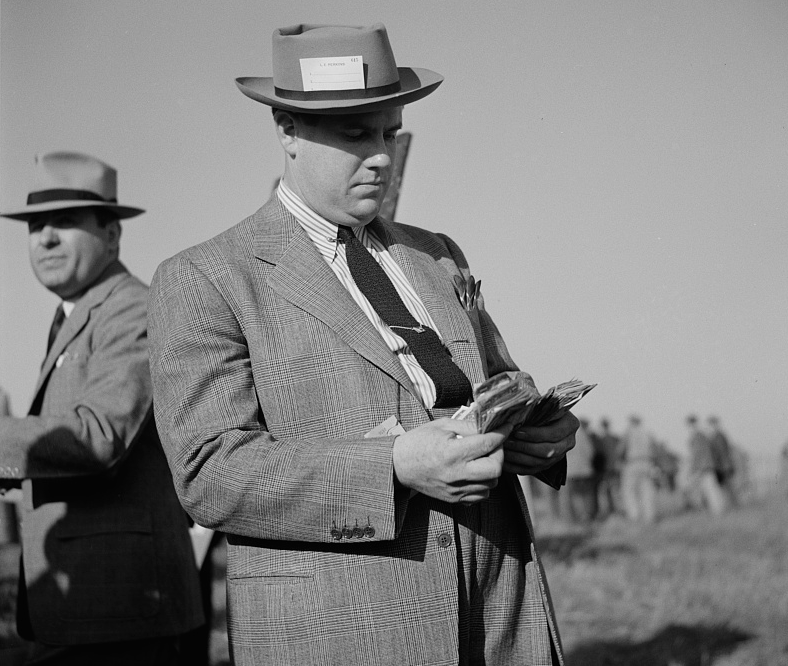
Source: Library of Congress, Bookies taking bets at horse races. Warrenton, Virginia

Source: Library of Congress, Bookies taking bets at horse races. Warrenton, Virginia
Racing horses has a long tradition in Virginia, after colonists brought the first horses in 1609. In contrast to the anti-gambling Puritans in Massachusetts, the Virginia colonists maintained English gambling traditions, including betting on horses. The Virginia Company of London, the financier of Virginia colonization until 1624, relied upon lotteries to survive at one point. After Charles II was restored to the throne in 1660, English society replaced the Puritanism of Oliver Cromwell with widespread gambling.1
Horse racing became identified as the "Sport of Kings" because only the very wealthy could afford to import horses for breeding or to maintain a horse for no productive use other than racing. Everyone could bet, but the gentry in colonial Virginia may have been the only class able to afford owning a race horse.
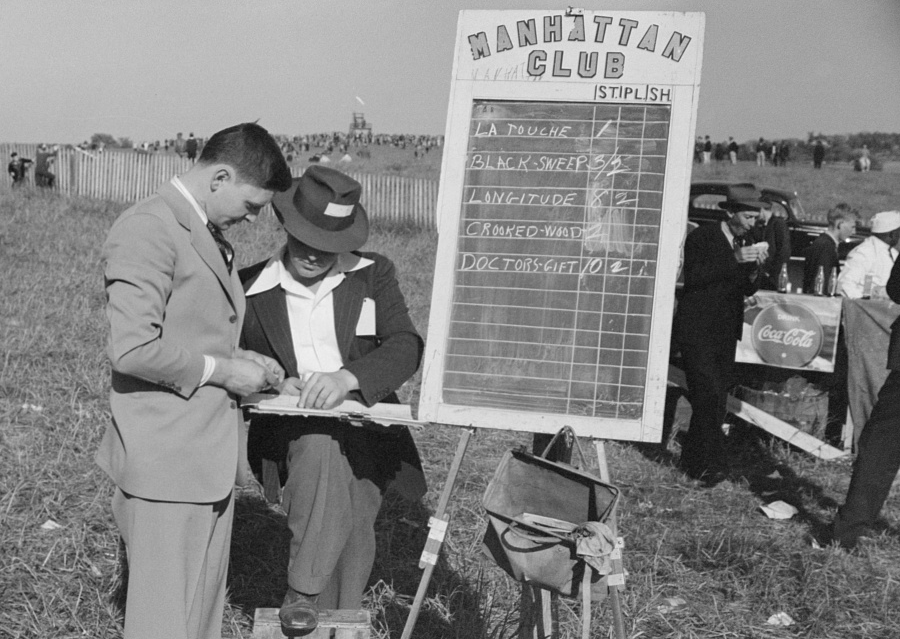
only the wealthy owned high-quality race horses, but everyone could bet on a race
Source: Library of Congress, Bookies taking bets at horse races, Warrenton, Virginia (by Marion Post Wolcott, May? 1941)
In 1674, the York County court imposed a fine on a tailor who had the nerve to race his horse ("it being contrary to Law for a Labourer to make a race, being a sport only for Gentlemen"). The court decision may have been triggered by the local gentry seeking to establish its status in a stratified society, but action may also have been triggered by revelation of a conspiracy between the horse owners to determine in advance which horse would win the race. Cheating on horse races in Virginia is as old as horse racing itself...2
Horse races occurred long before any site in Virginia was dedicated to serve exclusively as a race track. Many races were 1/4-mile straight dashes held on Saturday afternoons on open fields and straight sections of road, or "best-of-three" challenges where horses would run separate races up to 3-4 miles in one day. Formal races were organized on open courses through the Virginia countryside ("steeplechase" races were named after cross-country contests where start/finish lines were marked by steeples of churches), on roads between drivers with wagons (equivalent to modern harness races with Standardbred horses), and on circular racecourses (equivalent to modern Thoroughbred races viewed from grandstands at racetracks).
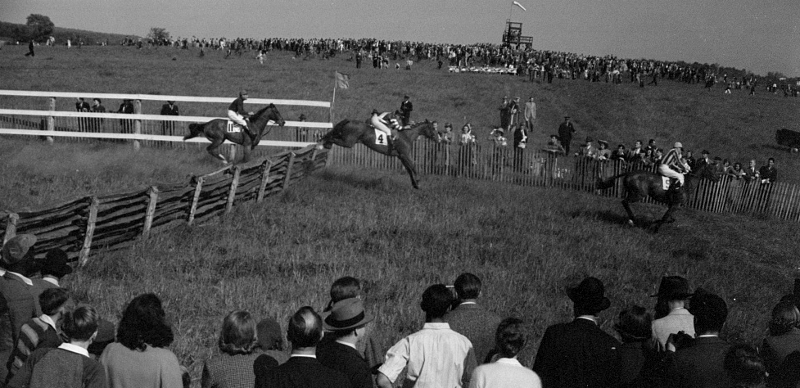
steeplechase races around a course include jumping obstacles, imitating what horses must cross in open-field racing
Source: Library of Congress, Horse races, Warrenton, Virginia (1941)
The first racetrack in the colonies was built at Hempstead Plain on Long Island, and the first in Virginia was a 1-mile oval operating by 1739 at Williamsburg. Horses circled the track several times to complete one race, compared to today's races of one-and-a-quarter miles (one-and-a-half miles for the Belmont Stakes). In the 1700's, Virginia had multiple racetracks, including:3
- Henrico County (Bermuda Hundred, Malvern Hill, Varina, Ware)
- Northampton County (Smith's Field)
- Northumberland County (Fairfield, Scotland)
- Rappahannock County (Rappahannock Church)
- Richmond County (Willoughby's Old Field)
- Surry County (Devil's Field)
- Westmoreland County (Coan Race Course, Yeocomico)
In 1752, William Byrd III claimed he had the fastest horse in the colonies. That challenge was bold enough for Benjamin Tasker Jr. He brought his mare Selima 150 miles from Maryland to Anderson's Race Ground in Gloucester for a match race.
Tasker had purchased his horse in England, and the elite Maryland plantation owners considered it a matter of pride that their horses were of higher quality than those in Virginia. Selima's sire was the Godolphin Arabian, one of three horses which started the Thoroughbred breed.
In the first Maryland-Virginia horseracing contest, Selima beat Byrd's horse, plus the other Virginia horses entered into the four-mile race. After Virginia then banned Maryland horses from other races, breeders bypassed that constraint by a simple maneuver. They brought their pregnant mares across the Potomac River so the foals were born in Virginia.
William Byrd III went on to demonstrate how excessive gambling can lead to bankruptcy and ultimately suicide. Selima became a highly-successful broodmare. After Tasker died, John Tayloe II bought the mare and kept her at his Mount Airy plantation in Richmond County.4
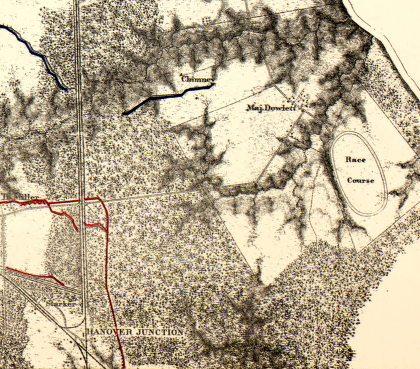
in 1864, the Union and Confederate armies fought at the North Anna River, west of the horse track near Hanover Junction
Source: Library of Congress, Military maps of the United States. - North Anna, Va., 1867
Legal authorization for gambling at Virginia horse races has changed over the years. In 1740, the General Assembly clarified that its first law on gambling passed in 1727, based on the "Statute of Anne," did apply to horse racing. However, in 1851 the General Court of Virginia ruled that horseracing was defined in state law as more of a sport than a game, and bets for less than $20 were not prohibited by state anti-gaming laws at that time.5
Two racetracks were built in Alexandria County (now named Arlington County) when it was still part of the District of Columbia. The Alexandria track operated approximately 1760-1810. The Mount Vernon track operated between 1841-1845, until it closed due to poor management.6
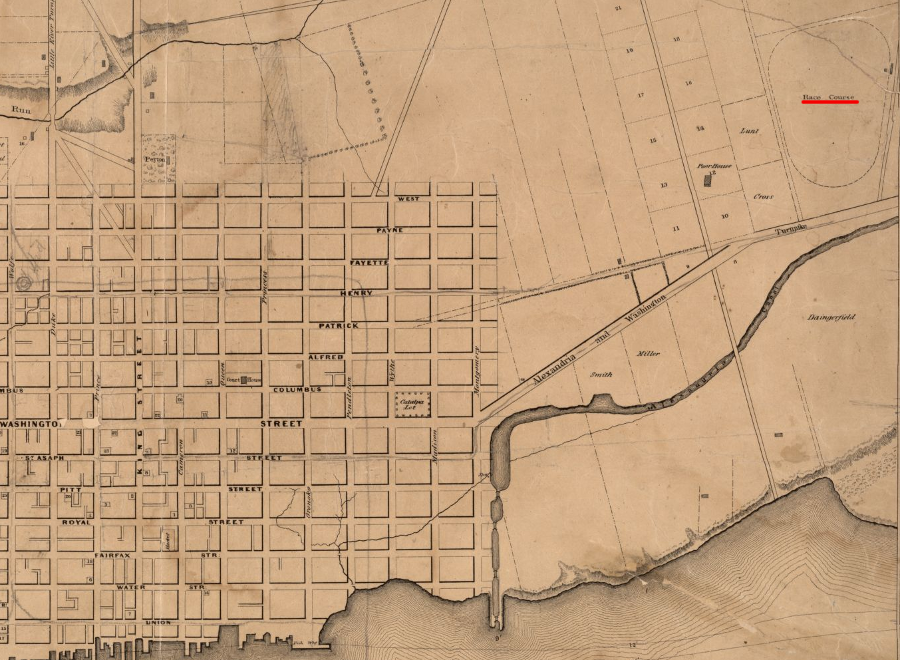
the Mount Vernon racetrack operated at Alexandria prior to the Civil War
Source: Library of Congress, Plan of the town of Alexandria, D.C. with the environs: exhibiting the outlet of the Alexandria Canal, the shipping channel, wharves, Hunting Cr. &c. (1845)
In the 1800's, horse tracks did not make their profits simply by taking a small share of every wager. Instead, tracks and gamblers bet against each other. The tracks had a direct interest in which horses won. A dishonest track that "fixed" a race could generate a major profit. Pari-mutuel betting, where winners get a share of money bet by all gamblers and the track collects a small percentage of the total bet, was not introduced into the United States until 1871.7
Corruption and Victorian standards of conduct led to a public reaction against gambling (and ultimately led to prohibition of alcohol as well). The General Assembly banned gambling at horse tracks in early 1894, but included a major exemptions for tracks on sites owned by agricultural associations or fairs, and driving clubs or parks. Those organizations were not expected to allow gambling dens for the lower classes.
The gamblers who managed establishments at Jackson City in Alexandria County, on the southern end of Long Bridge, found a way to continue.
One group acquired the charter of the Grange Camp Association that had operated in the 1880's in Fairfax County. They did not use their agricultural association charter to offer any agricultural fairs or for any other benevolent purpose. Instead, they built a new racetrack next to the Long Bridge crossing the Potomac River. With their charter, they were exempt from taxes as well as the ban on betting.
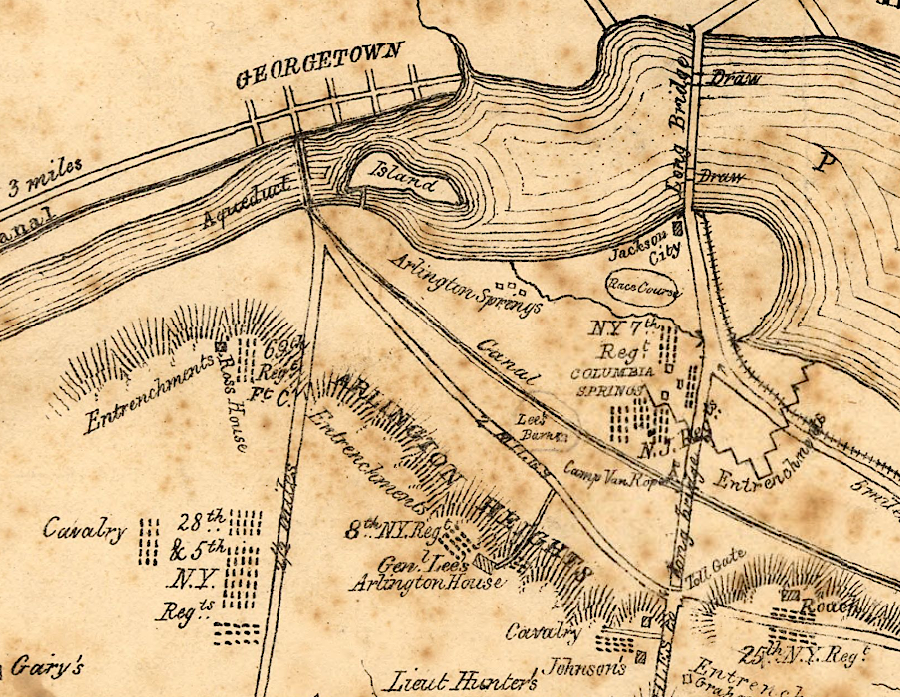
during the Civil War, Union mapmakers recorded the racetrack at Jackson City
Source: Library of Congress, Sketch of the seat of war in Alexandria & Fairfax Cos (by V. P. Corbett, 1861)
A competing group acquired the charter of the Gentleman's Driving Club in Alexandria County. In 1894 it opened a racetrack named the Gentleman's Driving Park at St. Asaph Junction, near the Del Ray neighborhood of Alexandria. The track was near the old location of the Mount Vernon track, which had closed in 1845. The grandstand with room for 3,000 people had electric lights, plus running water supplied by a two-mile long pipe connecting to the Alexandria water system. There were 16 round trip trains daily bringing customers from Washington, plus ferries crossing the Potomac River and connecting to the Mount Vernon Electric Railway.
Telegraph lines made it possible for gamblers to bet on races at other tracks in St. Louis, New Orleans, and elsewhere. About 40 bookies stayed busy taking bets, and the St. Asaph Racetrack made profits from its high-tech "poolroom" operations as well as from races at the track.
Governor O'Ferrall reported his frustration to the state legislature in 1895:8
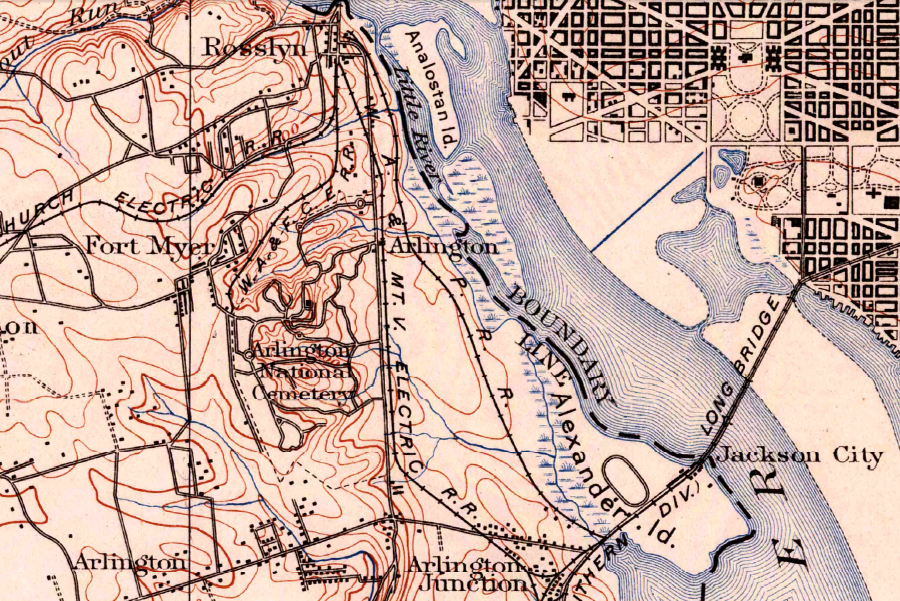
the Alexander Island racetrack opened in 1894, and attracted gamblers from Washington DC as well as Arlington County
Source: US Geological Survey (USGS), Washington-MD quadrangle (1:62,500 scale) (1900)
The General Assembly tightened the ban on gambling in 1897. That put the Alexander Island racetrack out of business, but by then the competitors had united and focused on St. Asaph's operations. Horses also stopped running at St. Asaph and the grandstand decayed. Betting paused while the racetrack was used as a quartermaster's depot during the Spanish American War, but restarted soon afterwards.
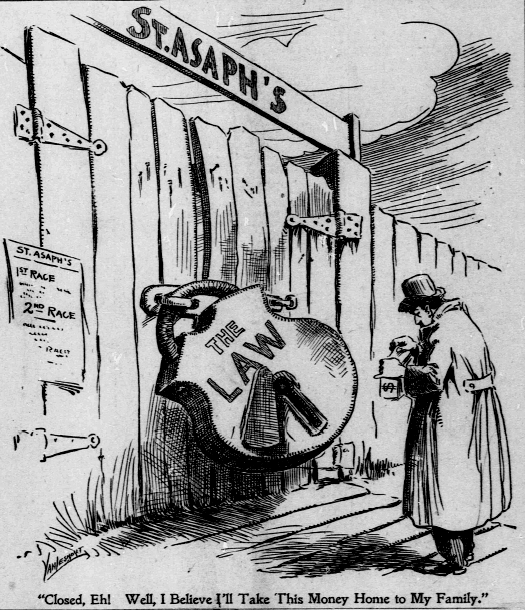
after St. Asaph Racetrack closed, gambling continued thanks to a loophole in state law created by the local State Senator
Source: Library of Congress, Chronicling America, Washington Times (January 13, 1905, p.1)
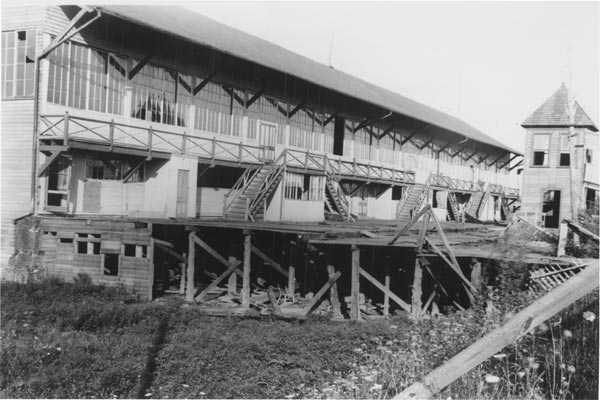
St. Asaph Racetrack grandstand, abandoned, in 1914
Source: Alexandria Library Special Collections, St. Asaph Racetrack (William Smith Photograph Collection, #551)
The St. Asaph track used a loophole in state law that was created specifically by the local State Senator, George Mushback. Not coincidentally, he benefited personally from the exception. Payoffs to Alexandria deputies working for the sheriff also were essential for perpetuating various forms of shady behavior at St. Asaph.
A "Gentlemen's Driving Club" at the St. Asaph track leased telegraph lines to get results of horse races run elsewhere, and allowed "gentlemen" to place bets on those races outside Virginia. Club operators claimed the money was wired to West Virginia via telegraph and the bets placed there; therefore, the ban on gambling in Virginia was not being violated.
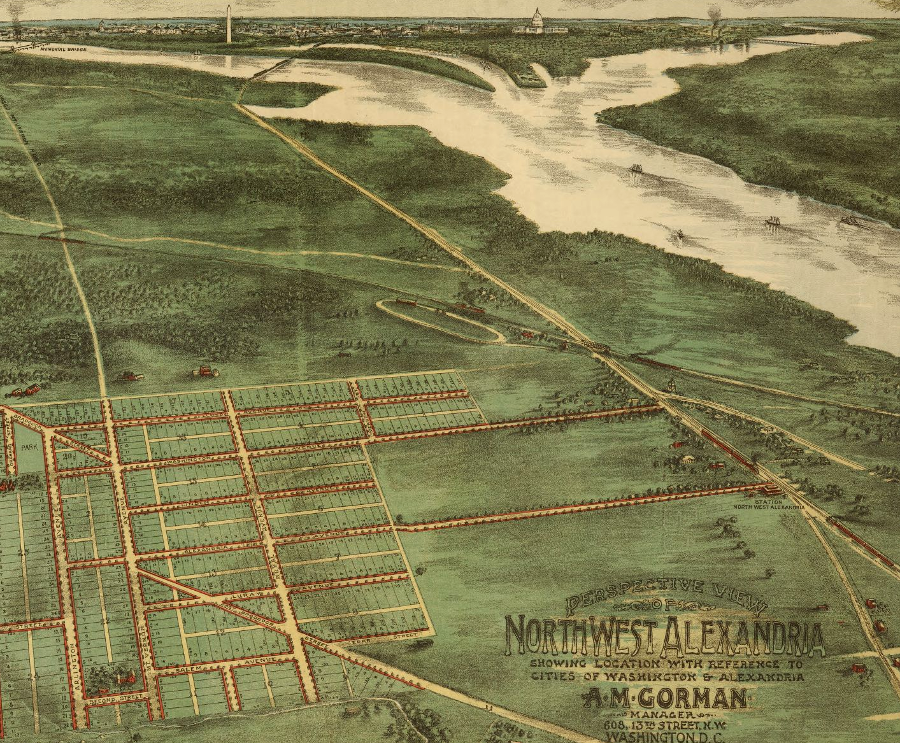
in the 1890's, the St. Asaph track was located next to railroads linking Alexandria with Washington, DC and Leesburg
Source: Library of Congress, Perspective view of northwest Alexandria: showing location with reference to cities of Washington & Alexandria (1890)
Crandal Mackey was elected Commonwealth's Attorney in 1903 for Alexandria County, as the reform candidate who promised to enforce the law. He cleaned out the gambling dens in Rosslyn and Jackson City, but struggled for two years to force even a temporary closure of the bet-by-telegraph operation at the old St. Asaph racetrack.
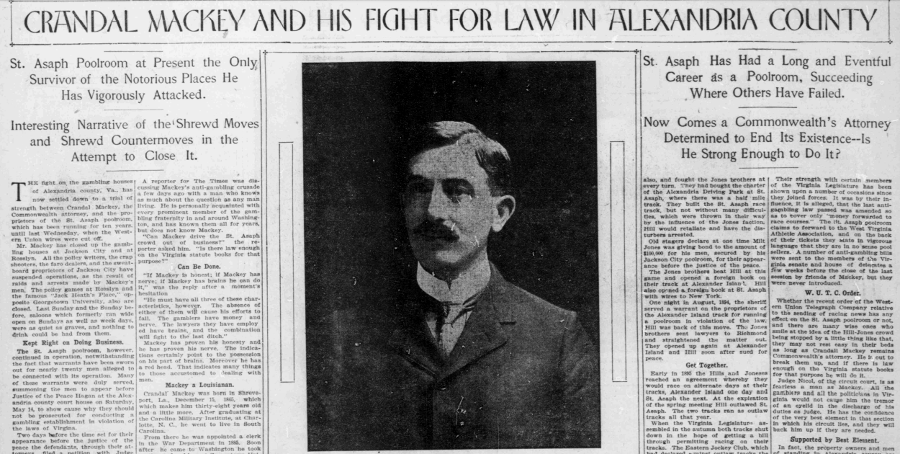
the crusading Commonwealth's Attorney, Crandal Mackey, struggled to end illegal gambling at St. Asaph's
Source: Library of Congress, Chronicling America, Washington Times (May 22, 1904, p.4)
Corruption in the Alexandria County government was common. The honest Commonwealth's Attorney could not enforce the law effectively, because the county sheriff and his deputies could not be trusted. One adversary was C. C. Carlin, who represented the St. Asaph track and various gambling houses as their lawyer.
In response, local residents near the racetrack arranged to create a new way to enforce the law. They got a charter from the General Assembly in 1908 and created the Town of Potomac. As a separate jurisdiction from Alexandria County, town officials hired their own policemen and finally stopped the gambling.
The Town of Potomac was annexed by the City of Alexandria and disappeared as a separate jurisdiction in 1930. By that time, the buildings at the St. Asaph racetrack and the old gamble-by-telegraph operation were long gone.9
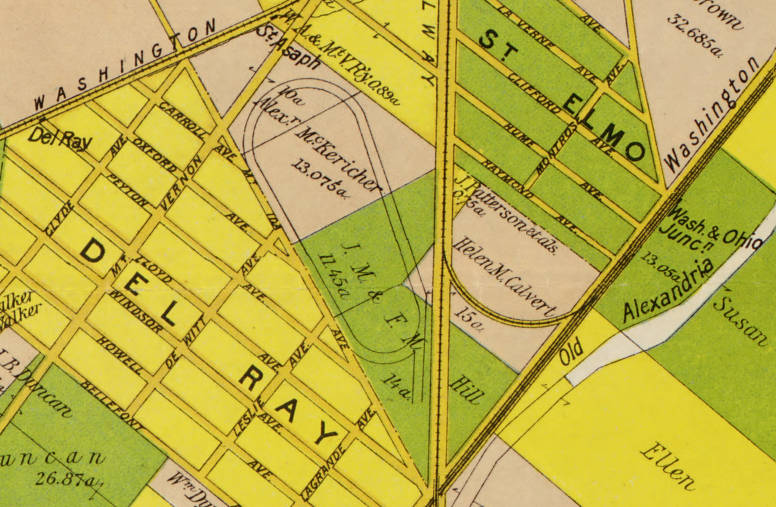
St. Asaph racetrack in the Del Ray neighborhood of Alexandria
Source: Map of Alexandria County, Virginia for the Virginia Title Co. (1900)
The ban on gambling at racetracks did not force closure of racetracks, though it affected the opportunity to make a profit by operating one. In 1908, a new harness racetrack opened in Fairfax County at Burke (where Burke Nursery and Garden Centre was located in 2014, near the intersection of Burke Road and Parakeet Drive). Henry Clay Copperthite, who made a fortune selling pies in Washington, DC, bought the Silas Burke House in 1899 for a summer retreat, as well as farmland in the area to supply his Connecticut Pie Company.
He opened the Copperthite Race Track on July 4, 1908 and maintained it until 1917. The facility was constructed for socializing and entertainment. President William McKinley, Vice President Theodore Roosevelt, and other notables kept horses at Copperthite's stables; he had no need to make a profit from gambling at his horse track.10
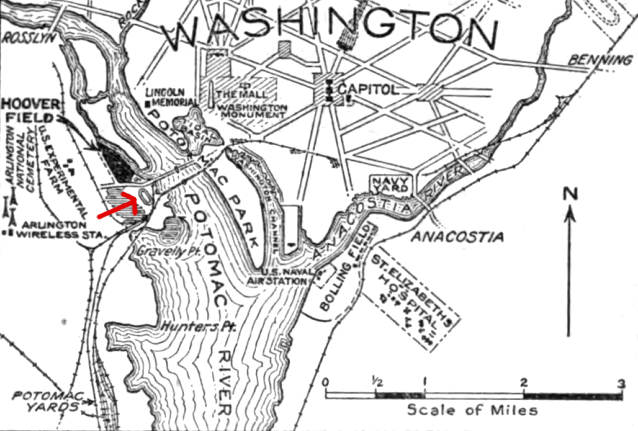
the old Jackson City racetrack was still a feature on the landscape in 1927, until replaced by Washington Airport
Source: Department of Commerce, Airway Bulletin No. 124 (1927)
In the 1900's, other states that had banned traditional betting at their racetracks began to legalize pari-mutuel betting, where gamblers bet against each other rather than bet against the track. Pari-mutuel betting at a racetrack is comparable to poker players betting against each other, while other table games and slots in a casino involve bets "against the house."
In pari-mutuel betting at a racetrack, people at the racetrack and off-track bettors watching the race at a distance via simulcast television create a pool of bets for each race. Winners collect from the pool, and size of winnings reflect both the odds on the horse and the size of the total pool. Racetracks serve just the middleman, processing bets and taking a percentage of the total pool to fund operations.
Pari-mutuel betting reduces the incentive for tracks to "fix" races. In pari-mutuel betting, the participants in the pool bet against each other. The racetrack gets just a percentage of the total betting pool, in contrast to the St. Asaph's days when the track funded bets and could make a hefty profit by determining winners and losers in a race. (By 2014, 32 states had racetracks that allowed pari-mutuel betting.)11
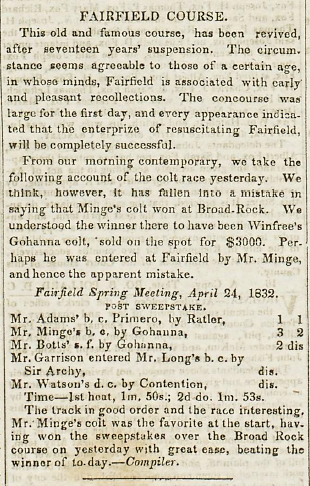
the Fairfield race track, on land owned by James Talley, reopened in 1832, after being closed for 17 years
Source: Virginia Chronicle, Richmond Whig and Commercial Journal (April 25, 1832)
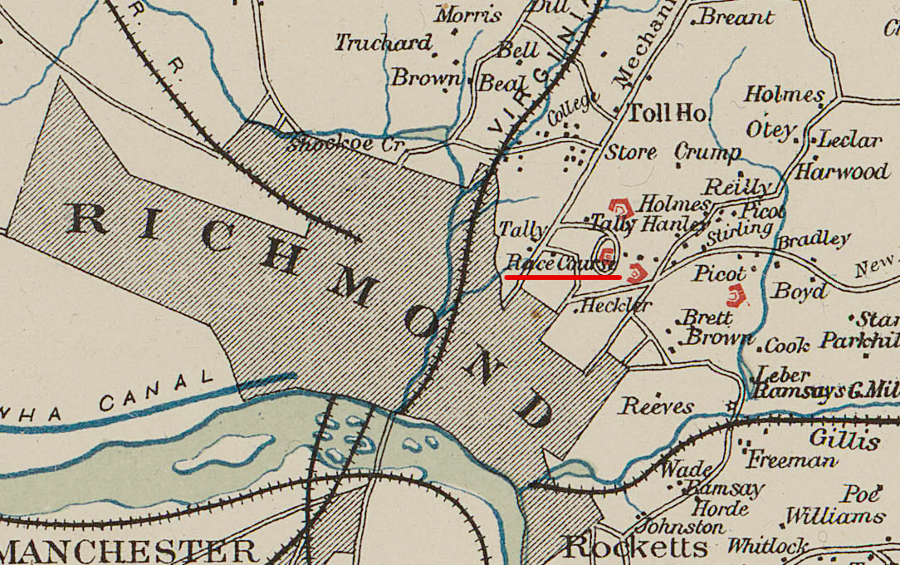
during the Civil War, Union cartographers mapped the Fairfield race course on the Talley property in Henrico County
Source: US War Department, Atlas to accompany the official records of the Union and Confederate armies, Southeastern Virginia and Fort Monroe Showing the Approaches to Richmond and Petersburg (1862)
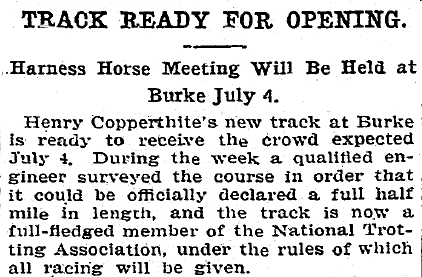
the harness race track in Burke (Fairfax County) operated from 1908-1917
Source: Washington Post, "Track Ready For Opening" (June 28, 1908)
In the 1950's, Thoroughbred horsemen started to ask the General Assembly to allow pari-mutuel gambling, but without success. Though betting at a Virginia horse race was not legal for a century between 1897-1997, it still occurred.
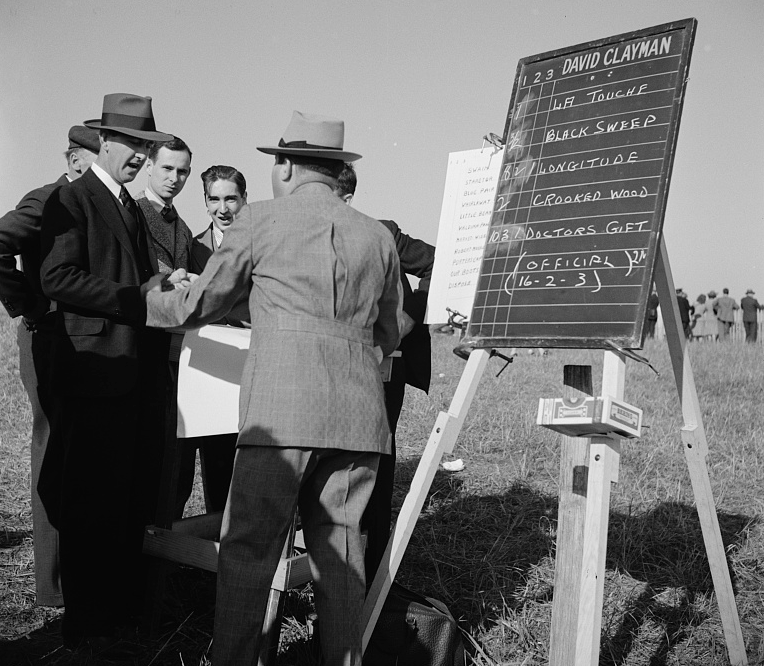
Source: Library of Congress, Bookies taking bets at horse races. Warrenton, Virginia (1941)
The Strawberry Races, a steeplechase event, ran at locations near Richmond from 1895-2012. The Camptown Races, named after a minstrel song by Stephen Foster, was a similar event held in Hanover County from 1953-1977. They were venues for much partying and many informal friendly wagers. The Camptown Races ended in 1977 after a jockey injured in 1975 filed a lawsuit, and landowners decided the risk of hosting the charity event was too great. The Strawberry Races stopped after the State Fair of Virginia went bankrupt, though Colonial Downs tried to cater to that market by offering the Dogwood Races in their place.12
Many other steeplechase events, such as the Foxfield Races in Charlottesville, have continued the Virginia tradition of holding outdoor parties where horses may or may not be watched, with many informal wagers on the side - but it was not until a Virginia farm bred the best Thoroughbred racing horse that ever lived that Virginians decided to permit a pari-mutuel racetrack.

horse racing in Virginia is a long-standing tradition
Source: Smithsonian Museum, Peytona and Fashion's Great Match (1845)
In 1972, Riva Ridge won the Kentucky Derby and Belmont Stakes. He had been bred three years earlier at Meadow Stable in Doswell, but foaled in Kentucky at Claiborne Farm.
In 1973, Secretariat - another Meadow Stable horse - won the Triple Crown, including the Preakness. Secretariat ran record times in all three Triple Crown races (though the clock malfunctioned during the Preakness), and drew national attention to the sport and to Meadow Stable's operations in Caroline County. However, throughout his lifetime it was illegal for him to race for money in the state where he was born.
Having a Virginia horse win five out of six Triple Crown events in 1972-73 spurred public interest in Virginia's horse industry. In 1978, the General Assembly finally authorized a statewide referendum to authorize pari-mutuel gambling in Virginia. It was defeated by the voters, and supporters suspected the opposition was funded in part by tracks and horse owners in nearby states who did not want extra competition from Virginia.13
Despite the defeat in 1978, public attitudes towards gambling changed over the next decade. The Virginia Lottery was approved in a 1987 vote, and in 1988 a referendum legalizing a horse track with pari-mutuel betting was approved. The Colonial Downs track finally opened in New Kent County in 1997. By that time, four Virginia-born horses had won the Kentucky Derby:14
1928: Reigh Count - born at Court Manor (Rockingham County)
1973: Secretariat - born at The Meadow (Caroline County)
1981: Pleasant Colony - born at Buckland Farm (Prince William County)
1993: Sea Hero - born at Rokeby Stables (Loudoun County)
In 2018, the Pamunkey tribe announced plans to open a gambling casino in Norfolk. Partially in response, the General Assembly approved a study in 2018 that was expected to lead to opening Las Vegas-style casinos at several locations within Virginia, with oversight by the Virginia Lottery Board.15
After the Pamunkey proposed a casino in Richmond, Colonial Downs responded with a counter-proposal. The Richmond Rosie's off-track betting parlor generated the most revenue for the horse-racing company, and a full-scale casino just 10 miles away would substantially impact business. While the General Assembly was considering authorization of casinos in the state, Colonial Downs requested that it be allowed to convert the Rosie's in Richmond into a casino.
The company noted that according to a 2019 study by the Joint Legislative Audit and Review Commission (JLARC), if the state permitted full-scale casinos then local tax payments from the historical horse racing games at off-track betting parlors would drop by 45%. Colonial Downs highlighted how its four Rosie's facilities in January 2020 were attracting patrons from outside the immediate region of each gaming emporium, creating new economic activity rather than simply shifting local entertainment dollars:16
- Colonial Downs (95%)
- Rosie's Hampton (85%)
- Rosie's Vinton (85%)
- Rosie's Richmond (75%)
Richmond ended up as the last city to choose a casino operator. The original legislation that could authorize such gambling had given the Pamunkey exclusive rights to a casino in Richmond and Norfolk; no competitive bidding was assumed there. However, two companies then sought authorization to open in Bristol or adjacent Washington County, and the advice from the Joint Legislative Audit and Review Commission to the General Assembly later in 2019 included:17
The president of the Virginia Equine Alliance also highlighted how the historical horse racing machines (HHR) in the Rosie's facilities and betting at the Colonial Downs track were generating benefits across the state, and warned that competition from casinos could have a catastrophic impact on the horse racing industry. Since Colonial Downs opened and historical horse racing machines were installed, there had been:18
The COVID-19 pandemic disrupted horse racing in 2020. The Virginia Gold Cup was postponed two months, then run without any audience. It was rare to have horse racing in Juune, 2020; many events were cancelled, while the Kentucky Derby was postponed from May to September. The Virginia Gold Cup Association had to refund money collected for ticket sales, leaving the organization in a financial bind. The four staffers were dismissed and the office in Warrenton was closed to reduce costs. The site of the Spring and Fall races, Great Meadow, reduced its rental fee by 50%. The Virginia Equine Alliance and the Virginia Horsemen's Benevolent & Protective Association funded the expenses for the 2020 races, including the purses for the meets.19
Colonial Downs opened on July 27, 2020 without spectators in the stands, after extreme heat forced cancellation of the scheduled July 17 event. The track had scheduled 18 race days in 2020, but another day was postponed due to a tropical storm. On August 14, Colonial Downs announced it would not run any more races in 2020. A jockey had tested positive for COVID-19, and the risk of spread of the disease would be too great.20
The track did not re-open until July, 2021, and in-person attendance rebounded after the pandemic. In 2022, the owners of Churchill Downs, home of the Kentucky Derby, announced plans to purchase Colonial Downs and six Rosie's Gaming Emporiums in a $2.5 billion deal. The Virginia Racing Commission authorized 27 live race dates for 2023, between July 13-September 9.
The new owners added three high-value races to the schedule. Two Grade 1 stakes, the Arlington Million and the Beverly D. Stakes, were moved from other tracks to Colonial Downs. A Grade 2 race, Secretariat Stakes, was also added. All three were scheduled for August 12, 2023 in hopes of getting a deal for national television coverage.
Moving the Beverly D. Stakes from a Kentucky racetrack to Virginia was especially controversial. The vote by the American Graded Stakes Committee to authorize the swich was reported to be 6-5.
Churchill Downs also altered the traditional schedule at the Colonial Downs racetrack. Instead of racing on Monday through Wednesday, in 2023 the races were switched to Thursday through Saturday in order to draw larger in-person crowds. In 2022, only 10% of the betting came from the average of 1,700 people at the actual race track.
The scheduling change placed the races in New Kent County (post time 1:30pm) in direct competition with events at the Saratoga Race Course in New York state (post time 1:05pm). The Excutive Dirctor of the Virginia Horsemen’s Benevolent and Protective Association questioned the decision to compete with Saratoga:21
The Gold Cup steeplechase race returned in October 2021 to the Great Meadow track for the 84th running. Actor Robert Duvall, who lived nearby, presented the trophy for the International Gold Cup Steeplechase.
The race was held in Fauquier County since 1922, but in 2024 the National Steeplechase Association determined that the Great Meadow site was unsafe for horses and jockeys. The turf did not meet standards after a 2024 summertime drought; 40% of the track was covered by dead grass or bare dirt. The Great Meadow Foundation response was "shock and great disappointment."
The Virginia Gold Cup Association rented the track from the Great Meadow Foundation for $300,000 annually in order to hold the Virginia Gold Cup each spring and the International Gold Cup in the fall. That contract required the track to meet National Steeplechase Association standards. After the National Steeplechase Association revoked its sanction, the 2024 International Gold Cup was moved to Glenwood Park in Middleburg. That course was available for the already-announced October 26 race date, but the sponsors pushed the race back a day to avoid conflict with another event already scheduled in Middleburg.22
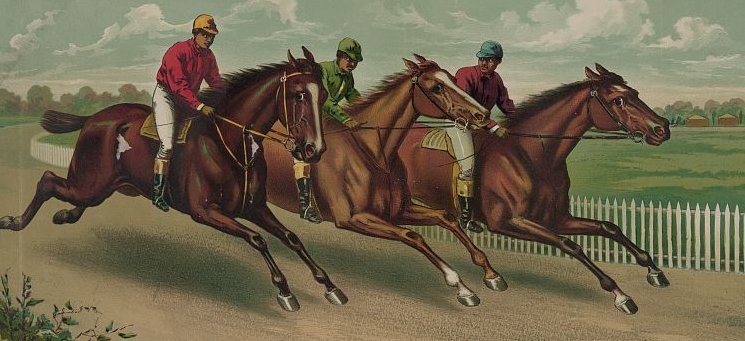
Virginia horse races evolved from best-of-three heats, with each race up to four miles, to shorter distances
Source: Library of Congress, Three men on horseback racing (1885)

the local newspaper, the Alexander Gazette and Virginia Advertiser, defended gambling at the Alexander Island racetrack
Source: Virginia Chronicle, Alexandria Gazette, Volume 96, Number 129, 30 May 1895 (p.2)